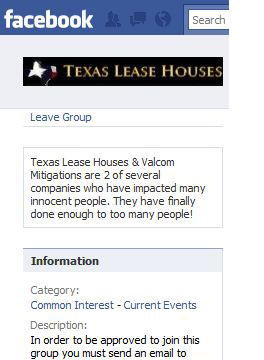You can use Facebook to strike back at businesses that treat you poorly — or worse — take your money or sell you a bad product. Social networking is a great communications tool to alert other customers and potential customers — and also alert the media and the authorities.
That’s what Teri Wilborn learned after she decided she wasn’t going to take it anymore.
She says she was owed almost $9,000 by a property management company she hired after connecting with the company through Craigslist, an online advertising Web site.
The company withheld money owed her from rent collections and a security deposit on a rental property the company managed for her, she said. She heard that other property owners were also owed money.
A friend suggested that Wilborn start a blog. She had a better idea:
“I think I’ll start a Facebook group page.”
Six weeks ago she introduced a Facebook group about the company, Texas Lease Houses.
Here’s what happened next:
The group gathered 107 members: “People started coming out of the woodwork,” she said.
They began sharing their stories about how Texas Lease Houses, operating out of a nearly empty shopping center in Watauga, Texas, took thousands of dollars from tenants for monthly rental payments and sometimes failed to pay the property owners.
Facebook group members soon included not only property owners who had signed management agreements with Texas Lease Houses, but also tenants, former employees and vendors whom the company owed money, she said.
“Ninety percent of them say they were hurt by him,” Wilborn said. “Vendors who lost money because he didn’t pay. Tenants who paid money to move into homes that they knew were in foreclosure and still paid him money. Former employees. People who lost their homes in his previous bankruptcy. Some who didn’t read the paperwork correctly.”
Matt Misczak, the owner of Texas Lease Houses, told me in a phone interview Friday that he intends to pay all his former clients what they are owed: “Absolutely, I’m paying the owners out.”
He said he has repaid about $60,000 and will pay $25,000 more.
Misczak said that he closed the company in March and that his customers were instructed then in two letters to contact a Dallas lawyer to make claims. “I didn’t run and hide,” he added.
Misczak, 39, said he hasn’t seen the Facebook site but has heard about it. Wilborn, he said, probably got “anxious” about her money, as did others. He also said bad feelings linger among clients who lost money in his 2006 bankruptcy.
Misczak’s troubles may go beyond financial ones.
Facebook group members began researching his background and posting the results on the free Web site.
They learned that Misczak, a 1988 Richland High School graduate, had his real estate license revoked in 2007. (He lost it for missing required continuing education classes, the state told me.)
Misczak explained: “I had a real estate brokerage, and the brokerage was licensed. I did not lease or list homes. The brokerage had a licensed agent that did that, and the brokerage itself was licensed.”
Facebook “friends” also learned that his company’s registration with the state expired last year, though they said he continued to conduct business. And the group hashed out the inner workings of the now-shuttered Watauga office and Misczak’s lifestyle (he likes expensive cars).
Wilborn, acting as page administrator, began recommending that people file complaints with the FBI, the Texas attorney general, the Texas Real Estate Commission, county district attorneys and police departments.
Complaints came “in a batch” at the Texas Real Estate Commission in recent weeks, said Kerri Galvin, the agency’s director of Standards & Enforcement Services.
“That’s a little alarming,” she said.
The commission said it opened an investigation in March of Texas Lease Houses and whether Misczak was operating without a real estate license.
“Under current laws in Texas, a person can own a licensed real estate brokerage company and not personally hold a real estate license, so long as the owner fully complies with the licensing requirements of the Real Estate License Act, and the owner does not engage in real estate brokerage activity on behalf of the company,” Galvin said.
“Real estate brokerage companies are required to have a personally licensed broker designated as a responsible officer for the company. In this particular case, our investigation
is ongoing and we can not comment on whether or not there was compliance with all of the requirements of the law.”
On April 1, the commission issued a news release titled “Real Estate Brokerage Scams in Dallas/Fort Worth Area.”
The release warned people about people who “represent themselves as real estate agents and real estate brokerage companies but do not hold Texas real estate licenses.”
Property owners, it continued, “claim to have lost large sums of money related to the group’s real estate schemes.”
The release did not name the company or any individual because the commission’s investigation had just begun, Galvin said. But complaints against Misczak “prompted” the statement, she said, “because we wanted to make sure the public was aware that there is a pattern.”
Marcos Castillo, owner of Valcom Mitigation, a loan modification business that operated out of Texas Lease Houses’ offices, is also named in the Facebook group with Misczak and his wife. Castillo said he was not an owner of Texas Lease Houses.
“I feel like there are a lot of uninformed people throwing as big a net and as much mud as they can to see if something sticks for them,” Castillo said.
Stay tuned, Misczak said: “If you’re watching that Facebook page, you’re going to hear that a lot of people are going to get their checks.”
OK, we’re staying tuned.
###
Dave Lieber, The Watchdog columnist for The Fort Worth Star-Telegram, is the founder of Watchdog Nation. The new 2010 edition of his book, Dave Lieber’s Watchdog Nation: Bite Back When Businesses and Scammers Do You Wrong, is out. Revised and expanded, the book won two national book awards in 2009 for social change. Twitter @DaveLieber





